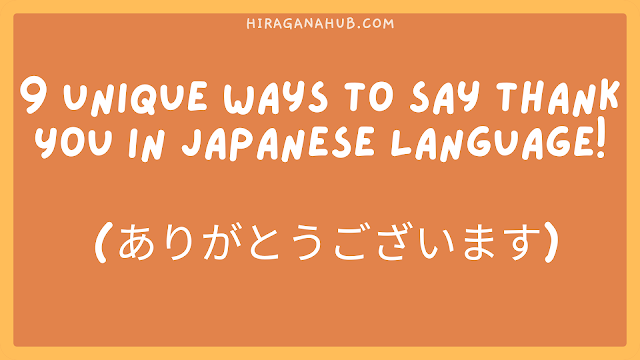It’s not just “Arigatou”! Learn 7 more polite, casual, and unique ways to say
thank you in Japan!
When learning Japanese, one of the first phrases learned for beginners is a
way to thank others, generally using the word “arigatou” (ありがとう).
However, did you know there are many ways to express gratitude in Japanese?
You can use different phrases depending on the situation, formality, and
relationship. In this article, I’ll introduce seven unique ways to say “thank
you” in Japanese, along with how to pronounce them and when to use them!
1. Arigatou Gozaimasu (ありがとうございます) – The Formal Way
If you want to be polite, use Arigatou gozaimasu. It’s used in formal
settings, such as when talking to a teacher, boss, or someone you respect.
Example:
店員: こちら、お釣りです。
Kochira, otsuridesu: Here’s your change.
客: ありがとうございます!
Arigatou gozaimasu!: Thank you very much!
2. Doumo Arigatou (どうもありがとう) – A Stronger Gratitude
This phrase is slightly more expressive than a simple “arigatou,” making it
great for truly appreciating something.
Example:
友達: プレゼントを買ってきたよ!
Purezento o kattekitayo!: I bought you a gift!
あなた: どうもありがとう!
Doumo arigatou!: Thank you so much!
3. Doumo (どうも) – Short & Casual
If you want to keep it short and informal, just saying “doumo” works. However,
it’s best for casual situations.
Example:
同僚: コーヒーを買ってきたよ。
Koohii o kattekitayo: I got you a coffee.
あなた: どうも!
Doumo!: Thanks!
4. Otsukaresama desu (お疲れ様です) – Thank You for Your Hard Work
This phrase is commonly used in workplaces or among colleagues to show
appreciation for someone’s efforts.
Example:
同僚: 今日も仕事お疲れ様でした!
Kyou mo shigoto otsukaresama deshita!: Good job today!
あなた:お疲れ様です!
Otsukaresama desu!: Thank you for your hard work!
5. Sumimasen (すみません) – Apology & Gratitude
This might surprise you, but “sumimasen” can mean both “sorry” and “thank
you.” It’s used when someone does a favor for you.
Example:
駅員: 傘を忘れましたよ!
Kasa o wasuremashitayo!: You forgot your umbrella!
あなた:
すみません!ありがとうございます!
Sumimasen! Arigatou gozaimasu!: Oh, thank you so much!
6. Osoreirimasu (恐れ入ります) – Ultra Formal Gratitude
This phrase is mainly used in business or customer service to show deep
respect and appreciation.
Example:
店員: 少々お待ちくださいませ。
Shoushou omachi kudasaimase.: Please wait a moment.
あなた:恐れ入ります。
Osoreirimasu.: Thank you very much.
7. Makoto ni Arigatou Gozaimasu (誠にありがとうございます) – Sincere Gratitude
This is another formal phrase that conveys deep sincerity, often heard in
speeches or formal events.
Example:
司会者: ご参加いただき、誠にありがとうございます!
Go sanka itadaki, makoto ni arigatou gozaimasu!: Thank you sincerely for joining us!
観客: (Clapping)
8. Kokoro kara Kansha Shimasu (心から感謝します) – Thank You from the Heart
This phrase expresses deep gratitude from the heart, often used in heartfelt
moments or letters.
Example:
先生: あなたの努力を見ていました。
Anata no doryoku o mite imashita.: I’ve seen your hard work.
あなた:心から感謝します!
Kokoro kara kansha shimasu!: I sincerely thank you!
9. Goshinsetsu Arigatou Gozaimashita (ご親切ありがとうございました) – Thank
You for Your Kindness
This phrase expresses gratitude for someone’s kindness, especially in formal
situations.
Example:
看護師: お手伝いしましょうか?
O tetsudai shimashou ka?: Shall I help you?
あなた:ご親切ありがとうございました!
Goshinsetsu arigatou gozaimashita!: Thank you for your kindness!
How to Pronounce These Phrases?
If you’re wondering how to say these expressions correctly, listening to audio
pronunciation is highly recommended. Try practicing by mimicking native
speakers to get the pronunciation right.
Formal vs. Informal Ways to Say Thank You
Formal: Arigatou gozaimasu, Osoreirimasu, Makoto ni arigatou gozaimasu,
Kokoro kara kansha shimasu, Goshinsetsu arigatou gozaimashita
Informal: Doumo, Sumimasen, Otsukaresama
Mastering different ways to say thank you in Japanese will make your
conversations more natural and culturally appropriate. Try using these phrases
and impress your Japanese friends!
Which one is your favorite? Let me know in the comments!



